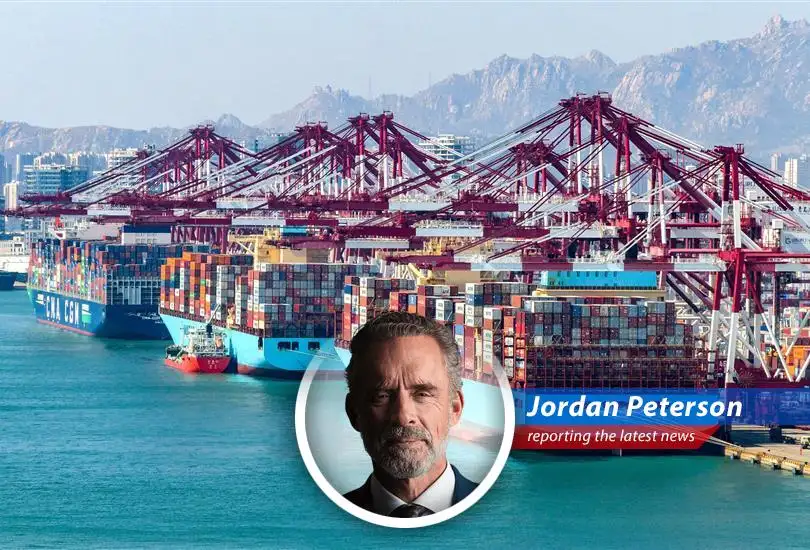
Order on the Seas: Cleaning Up the Shipping Chaos
Right so the United Nations shipping agency—that's the International Maritime Organization or IMO for short because acronyms are the 21st century's Tower of Babel—is thinking about slapping a carbon tax on the shipping industry. Now you might be thinking 'Jordan what does this have to do with cleaning my room?' Well everything bucko! It's about taking responsibility. The shipping industry it's a bit of a pigsty emitting around 3% of global carbon emissions. That's like leaving your dirty socks under the bed—it might not seem like much but it adds up. And what happens when you don't clean your room? Chaos. Existential dread. The same applies here. If we don't get our act together we're headed for a metaphorical and perhaps literal environmental apocalypse. So the IMO is considering this carbon levy. A tax! The horror! But before you start railing against the tyranny of taxation consider this: sometimes a little bit of discomfort is necessary to bring order to the chaos. Think of it as tough love from the UN. Will it work? Who knows? But at least they're trying to sort themselves out.
Lobsters and Carbon: A Tale of Two Shells
Now some people are thrilled about this like Sara Edmonson from Fortescue who calls the talks 'absolutely historic.' Historic! That's quite a claim. But you know I remember when someone told me that eating only meat was 'absolutely historic' for reversing their diabetes. That's a different story altogether... Still historic moments can happen and I am not one to take away someone's optimism about cleaning up their act. The fact is the global shipping industry has to take steps to be sustainable. Others are not so keen. Brazil China and Saudi Arabia are apparently concerned about economic competitiveness and inequalities. Inequalities! Now that's a word that gets thrown around a lot these days. Are there inequalities? Yes probably. But is a carbon tax going to solve them? That's like using a lobster to crack a walnut—you might get the job done eventually but there are probably better tools for the task. And speaking of lobsters do you think they worry about their carbon footprint? Probably not. But then again they're not running massive cargo ships across the ocean.
The Devil You Know: Levy Like Structures and the Dance Around the Abyss
Ah the 'levy like structures.' Politicians love those don't they? It's like calling a spade something other than a spade because saying 'spade' might offend someone. This is where things get interesting though because we're dealing with international politics here. The word 'levy' is apparently a trigger word in the U.S. Australia and even China. Trigger word! Because everything is traumatic nowadays. So instead of calling it a levy they're exploring 'levy like structures.' I imagine these are like the shadow of a levy or a levy in disguise. Now there's a lesson here. Sometimes you have to be indirect to get things done. You can't just walk into a room and start shouting about carbon taxes. People will get defensive. You have to approach the issue with a bit of finesse. You have to clean your room but you have to do it in a way that doesn't upset your parents or your government or the global trade balance.
The UNFCCC: When Bureaucracy Becomes a Religion
Then we have Vanuatu Minister Ralph Regenvanu chiming in. According to him 'the UNFCCC isn't moving fast enough.' The UNFCCC! That's the United Nations Framework Convention on Climate Change. Another acronym! And apparently not a very efficient one. It would be the understatement of the century to say that bureaucracies are not exactly paragons of speed and efficacy. Bureaucracy when left unchecked becomes an idol to be worshipped. And what happens when you worship idols? You end up lost in the desert wondering why nothing is getting done. So Vanuatu sees this IMO thing as 'the great opportunity.' A great opportunity to do what exactly? To impose more regulations? To make shipping more expensive? To virtue signal on a global scale? Time will tell. But I sure hope they are not kicking the can further down the road.
Between Order and Chaos: The Ambitious Dream and the Unhappy People
John Maggs of the Clean Shipping Coalition says 'It's not really a question of whether they get agreement it's just how ambitious it is how effective it is and how many unhappy people there are.' Ah the unhappy people. They're always there aren't they? You can't please everyone. But you can try to create a system that is at least reasonably fair. Now Maggs warns about a gap between the 'progressive and more conservative forces' at the IMO. More ideological divisions! It's everywhere you look. But here's the thing: if you want to get anything done you have to find common ground. You have to find a way to bridge that gap. You have to clean your room but you have to do it in a way that doesn't start a civil war in your family. Or in the global shipping industry.
Decarbonization and Destiny: The Hardest Industry to Tidy Up
So the shipping industry apparently is one of the 'hardest industries to decarbonize.' Of course it is! It's huge it's complex and it relies on vast amounts of fossil fuels. But that doesn't mean we can't try. As Angie Farrag Thibault of the Environmental Defense Fund says we need a 'decisive' economic measure. Decisive! A word that sends shivers down the spines of bureaucrats everywhere. So what can we expect from this? The question we should all be asking is: can we clean our rooms? Can we find a way to balance economic growth with environmental responsibility? The answer as always is complicated. But it starts with acknowledging the problem and then setting a goal and then cleaning up your act. And maybe just maybe if we can clean up the shipping industry we can clean up the rest of the world too.













simonwilby02
A carbon tax? More like a virtue signaling tax! This won't solve anything.
lulu2010
I'm cautiously optimistic. It's good to see some action being taken, even if it's imperfect.
crystalblue7
Great points made, but still a long way to go to have shipping be a truly sustainable industry.